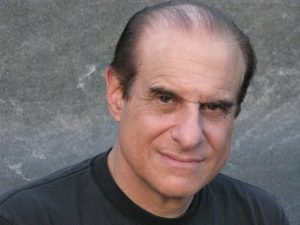
 In "Imagine Dat!" at Stage 72, Jon Freda pays an affectionate and deserved biographical tribute to 20th century showbiz icon Jimmy Durante. Freda also wrote this one-man-show-with-music and co-produced it with its director, Eren T. Gibson. The 70-minute piece has the imprimatur of the surviving Durante family, which might suggest that it would be a whitewash. Nothing doing. Freda dives right into Durante's hardscrabble early life on New York's Lower East Side as "an angry little boy with a broken nose"; his toiling as a singing waiter in gangster-run clubs as a kid, and later, during Prohibition, playing piano in speakeasies—even owning one, Club Durant, for a time; his first wife's alcoholism and early death; his own workaholic absences from her life; and his many "little white lies" to cover his tracks over the course of his long life.
In "Imagine Dat!" at Stage 72, Jon Freda pays an affectionate and deserved biographical tribute to 20th century showbiz icon Jimmy Durante. Freda also wrote this one-man-show-with-music and co-produced it with its director, Eren T. Gibson. The 70-minute piece has the imprimatur of the surviving Durante family, which might suggest that it would be a whitewash. Nothing doing. Freda dives right into Durante's hardscrabble early life on New York's Lower East Side as "an angry little boy with a broken nose"; his toiling as a singing waiter in gangster-run clubs as a kid, and later, during Prohibition, playing piano in speakeasies—even owning one, Club Durant, for a time; his first wife's alcoholism and early death; his own workaholic absences from her life; and his many "little white lies" to cover his tracks over the course of his long life.
Freda bears enough resemblance to his subject to be believable, down to the prominent trademark nose. Durante overcame his derisive Italian-American childhood nickname, Il Naso (The Nose) to become positively, even lovingly, widely known as The Schnoz. Freda effectively conveys this transition into Durante's decades-long insouciant self-confidence, nowhere more engagingly than in his spirited version of Durante's self-written (music and words) 1928 number "(I Can Do Without Broadway, But) Can Broadway Do Without Me?" (from Show Girl, starring Clayton, Jackson and Durante). Lou Clayton, a soft-shoe dancer, and Eddie Jackson, a cake-walking boulevardier in a top hat and tails, remained Durante's showbiz partners for most of their lives, and in performing this song, Freda effectively breaks into credible impersonations of these two men, right down to Jackson's top hat and cane.
Freda sings about as well as Durante did, if not in exactly the same way. He uses Durante's self-deprecating lines about his singing, such as "I got that last note from Bing Crosby, and boy was he glad to get rid of it." Freda also incorporates other Durante signature lines in his narrative: "Everybody wants to get into the act"; "Goodnight, Mrs. Calabash, wherever you are" (although we still don't find out who she was); and, of course, this show's title, "Imagine Dat!" Freda's effective renditions of other Durante-written songs include "Inka Dinka Doo" and "You Gotta Start Off Each Day with a Song."
The spine of this piece, while not exactly original, is workable. Durante has died, and he leaps up from his funeral parlor bier to find himself in something approaching God's Waiting Room, and needing to "reconcillerate" his life to The Big Guy before he can go on to any afterlife. "Reconcillerate" is but one of no fewer than five Durante malapropisms for "reconcile"; the others are "reconsighted," "reconstyle," "reconsmile," and "recompile." Freda uses all five in the course of his show, and helpfully provides a glossary of 77 Durante malapropisms with the show's program, including "probuskator" and "schnozzola" for "nose." Freda also provides another helpful aid, too often missing from the programs of biographical shows: a bibliography of his sources on his subject's life.
So many malapropisms, once removed from their source, are less than hilarious here, not unlike someone else quoting too many of Berra's "Yogi-isms." And there may be no piano in purgatory, but the iconic image of Durante, and the reference point of much of Freda's recounting, is Jimmy seated at the piano, his hat atilt and a big smile on his face as he looks right at his audience. Portraying someone who started as a child piano player and remained one all his life, no matter what else he was doing, without an actual piano is a serious failing of this show. Even if Freda can't play the piano, he could mime fingering a real keyboard while the tape is playing. (All of the instrumental music in the show is canned, another minus). His standup and walking around piano-keyboard miming just doesn't work well enough. The show also could use some visual aids in the background, stills or film clips of Durante's long live-performing career, leading to an even greater success in recordings, radio, television and movies. With someone who died in 1980 and retired to illness long before that, you can't count on much audience memory to carry you through. A metaphor, perhaps, for this barebones production was the rickety funeral bier's collapse, with Freda lying on it, the night I saw the show. But, as evidence of his aplomb, unhurt, he not only kept speaking his dialogue, he did Durante's customary upside down bicycle pedaling exercises on the floor, atop the remains of the bier.
Freda's satisfying finale songs are "Young at Heart" (Johnny Richards, Carolyn Leigh) and "Make Someone Happy" (Jule Styne, Comden & Green), which occasioned a posthumous mini-comeback when Durante's indelible versions of the songs were featured on the soundtrack of Sleepless in Seattle.